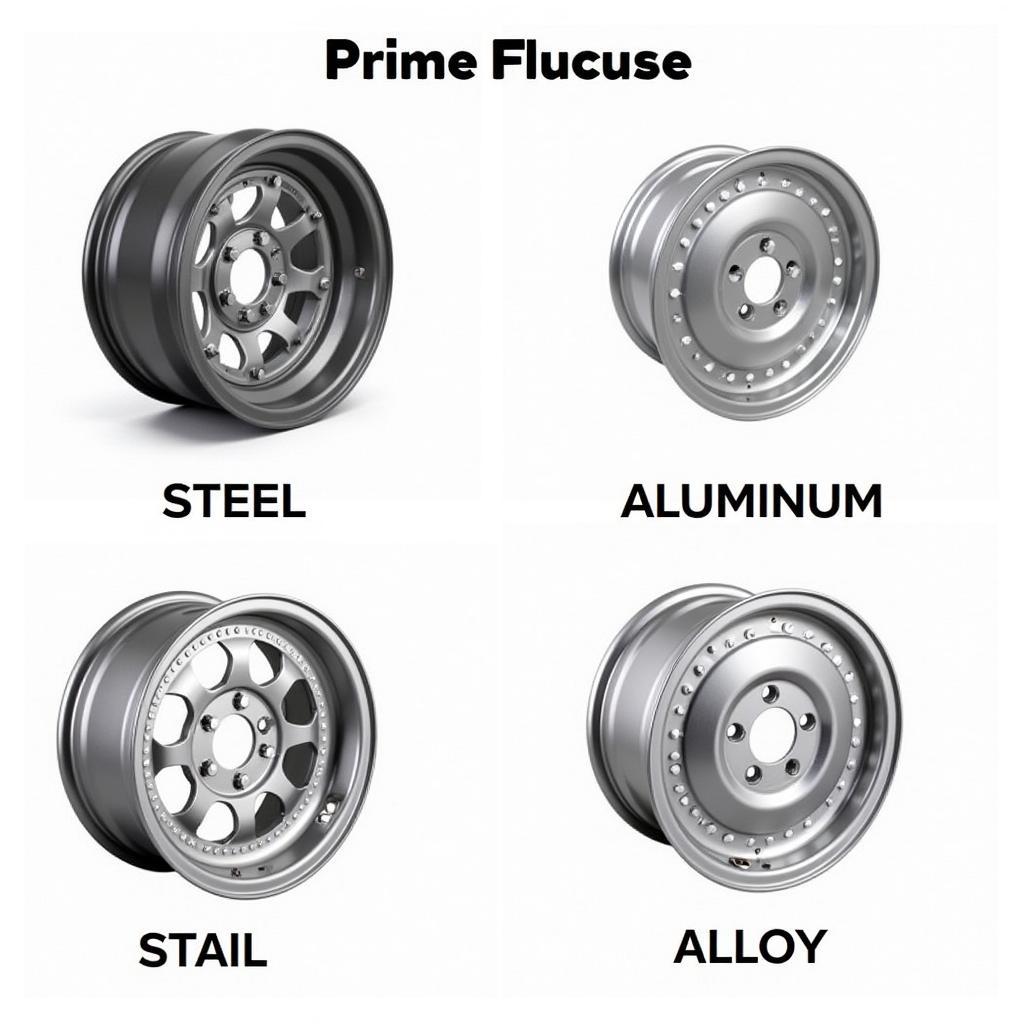Horse Trailer Rims are a critical component of your horse transportation setup, impacting safety, performance, and longevity. Choosing the right rims isn’t just about aesthetics; it’s about ensuring a smooth, reliable, and safe journey for your equine companions. This guide will delve into the essential aspects of selecting horse trailer rims, empowering you to make informed decisions.
 Different Types of Horse Trailer Rims
Different Types of Horse Trailer Rims
Understanding the Importance of Horse Trailer Rims
Why are horse trailer rims so important? They bear the weight of the trailer, horses, and all your equipment. They also significantly influence the trailer’s handling, fuel efficiency, and overall performance. Selecting the wrong rims can lead to premature tire wear, decreased fuel economy, and even dangerous blowouts. Don’t underestimate the impact of this seemingly small component! Remember, your horse’s safety is paramount. Investing in quality horse trailer rims is an investment in their well-being.
Key Considerations When Choosing Horse Trailer Rims
Material Matters: Steel vs. Aluminum
The most common materials for horse trailer rims are steel and aluminum. Steel rims are known for their durability and affordability. However, they are heavier, which can impact fuel efficiency. Aluminum rims, on the other hand, are lighter, offering improved fuel economy and a smoother ride. They are also more resistant to rust. However, they can be more expensive than steel. Choosing between steel and aluminum often comes down to balancing budget and performance needs. Which is the better choice for you? Consider your typical travel distances, terrain, and budget. For those frequently hauling long distances, aluminum might be a worthwhile investment despite the higher upfront cost. For those with miniature horses, and looking for other accessories, check out miniature horse sneakers.
Size and Capacity: Matching Rims to Your Trailer
The size and load capacity of your horse trailer rims must match your trailer’s specifications. Overloading your rims can lead to dangerous consequences, including rim failure and blowouts. Refer to your trailer’s owner’s manual for the recommended rim size and load rating. Always prioritize safety over cost. Never compromise on the load capacity of your rims.
Considering the Terrain: On-Road vs. Off-Road
Do you primarily travel on paved roads or venture onto rougher terrain? If you regularly travel off-road, consider heavy-duty rims designed for challenging conditions. These rims are typically constructed from thicker materials and feature reinforced designs to withstand the rigors of off-road travel.
Bolt Pattern and Offset: Ensuring Proper Fit
The bolt pattern and offset of your rims must be compatible with your trailer’s hubs. The bolt pattern refers to the number of lug holes and the diameter of the circle they form. The offset determines how far the wheel sits in relation to the hub. An incorrect bolt pattern or offset can lead to improper wheel mounting and potential safety hazards.
Maintaining Your Horse Trailer Rims
Regular maintenance is crucial for extending the lifespan of your horse trailer rims. Keep your rims clean by washing them regularly with soap and water. Inspect your rims for any signs of damage, such as cracks, bends, or corrosion. Address any issues promptly to prevent further damage. Properly inflated tires are essential for protecting your rims. Underinflated tires can cause excessive stress on the rims, leading to premature wear and tear. If you’re interested in exploring other horse-related equipment, you might find information on parts of horse carriage useful.
Conclusion
Choosing the right horse trailer rims is a crucial decision that directly impacts the safety and performance of your trailer. By considering the factors outlined in this guide, you can confidently select rims that meet your specific needs and ensure a smooth, reliable, and safe journey for your equine companions. Remember, investing in quality horse trailer rims is an investment in the well-being of your horses. Need a new trailer entirely? Check out mini horses for sale in pa!
FAQ
- How often should I replace my horse trailer rims?
- What are the signs of a damaged horse trailer rim?
- Can I use aluminum rims on a steel trailer?
- How do I determine the correct bolt pattern for my trailer?
- What is the difference between load range and load index?
- How can I prevent rust on my horse trailer rims?
- What are the benefits of using alloy rims on a horse trailer?
Common Scenarios and Questions:
-
Scenario: You are hauling your horse long distances and notice your fuel consumption is higher than usual. Question: Could the wrong type of rims be contributing to this issue?
-
Scenario: You are driving on a bumpy gravel road and hear a loud clanging noise coming from your trailer. Question: Could this indicate a damaged rim?
-
Scenario: You are preparing for a long trip with your horse and want to ensure your trailer is in optimal condition. Question: What should you check regarding your horse trailer rims before embarking on a long journey?
Further Resources:
Consider checking out our other articles on miniature horse sneakers for more information on specialized equine footwear, and parts of horse carriage for a deeper understanding of carriage components. If you are looking to purchase a new miniature horse, our guide on mini horses for sale in pa can be a valuable resource.
Contact Us:
For any assistance, please contact us at Phone Number: 0772127271, Email: [email protected] or visit us at QGM2+WX2, Vị Trung, Vị Thuỷ, Hậu Giang, Việt Nam. We have a 24/7 customer support team.